
All Content


Comparing Three Financing Options for President Biden’s Spending Proposals
While Congress continues to debate how to pay for President Biden’s spending proposals in the fiscal year 2022 budget, it is useful to consider the economic impact of a range of financing options in addition to the President’s proposed tax increases.
3 min read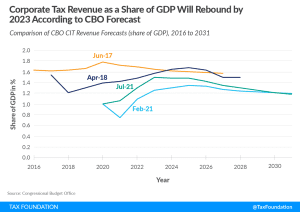
Corporate Tax Revenue Forecasted as Robust following the 2017 Tax Reform
In light of these forecasts, which could be revised upwards further given the pace of growth in the economy and corporate profits, it seems clear that the 2017 tax reform did not substantially reduce the revenue potential of the corporate tax.
3 min read
Here’s How Louisiana’s Tax Plan Would Simplify the Tax Code and Benefit Residents
Louisiana legislators passed a tax reform plan that has received overwhelming support in both the House and Senate, but voters will get the ultimate say on whether that plan succeeds. In light of this, it may be valuable to walk through what is included in these reforms and what effect the changes will have on taxpayers.
5 min read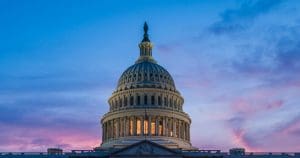
The Bipartisan Infrastructure Plan Avoids Tax Increases, Undermines User-Pay Principle, and Misses Chance to Modernize Obsolete Programs
The good news is that lawmakers avoided raising taxes to cover the cost of the new spending and instead used some reasonable fees and asset sales. The bad news is that half of the offsets come from unused, debt-financed COVID-19 relief funds and the economic return on many of these investments is questionable.
7 min read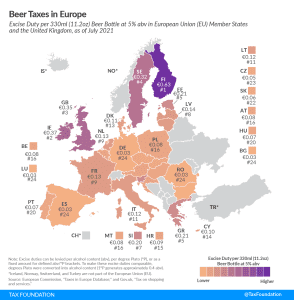
Beer Taxes in Europe, 2021
Finland has the highest excise tax on beer in Europe, followed by Ireland and the United Kingdom. Compare beer taxes in Europe this International Beer Day
3 min read
How Did We Ever Agree to Fund Infrastructure Investments?
As lawmakers explore funding mechanisms for additional federal infrastructure investment, they should focus on permanent, sustainable, and transparent revenue options that conform to the benefit principle. Permanent user fees, appropriately adjusted to restore and maintain their purchasing power, would serve as ideal revenue sources for federal infrastructure investments.
5 min read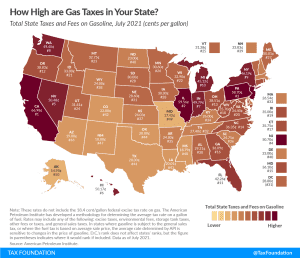
Gas Tax Rates by State, 2021
California pumps out the highest state gas tax rate of 66.98 cents per gallon, followed by Illinois (59.56 cpg), Pennsylvania (58.7 cpg), and New Jersey (50.7 cpg).
3 min read
Simplifying the Tax Code and Reducing the Tax Gap: What Can Be Achieved?
Reducing the tax gap is, on the margin, a good way to raise revenue, but is not without costs. Policymakers should consider compliance costs for law-abiding taxpayers as well as administrative costs for the IRS when evaluating measures to reduce the tax gap.
33 min read
Asian and Pacific Countries Faced Revenue Loss Prior to COVID-19 Outbreak
As economies are starting to recover and growth is expected to rebound in the region during 2021, Asian and Pacific countries should start exploring changes to their fiscal tax policies while carefully evaluating the optimal time for eliminating fiscal stimulus and temporary tax relief.
4 min read
D.C.’s Income Tax Hike Helps Maryland and Virginia, Not D.C.
Even as lawmakers in eleven states have cut income taxes this year, the D.C. Council has responded to surpluses and growth by voting to include substantial income tax increases in the budget.
7 min read
Amortization Deductions for Sports Teams Properly Part of the Income Tax System
The media has reported on how wealthy taxpayers who own sports teams lower their tax liability by deducting the cost of purchasing a sports team over 15 years. Contrary to claims that deducting the cost of a sports team from taxable income is a “loophole,” such deductions are a normal and proper part of the income tax system.
3 min read
Survey Shows Growing Tax Complexity for Multinationals
New data clearly points to an increase in tax complexity for multinationals in the OECD as well as globally. The OECD’s ongoing efforts to reform the international tax system will likely further add complexity to the international tax environment.
3 min read
North Carolina Considers Corporate Income Tax Repeal and Individual Income Tax Relief
Taken together, the proposed reforms would further solidify North Carolina’s position as a leader in sound tax policy and as a state whose tax code is among the most conducive to generating long-term economic growth.
7 min read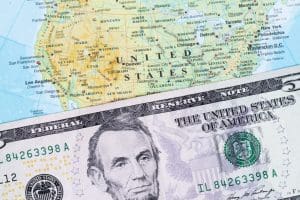
Illuminating the Hidden Costs of State Tax Incentives
In most states, tax incentives abound, usually offered as a way of promoting new investment or attracting certain industries by shielding them from the full impact of otherwise high tax rates.
6 min read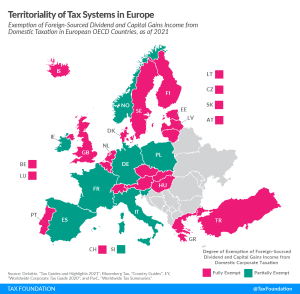
Territoriality of Tax Systems in Europe
19 European OECD countries employ a fully territorial tax system, exempting all foreign-sourced dividend and capital gains income from domestic taxation. No European OECD country operates a worldwide tax system.
3 min read
Intellectual Property Came Back to U.S. after Tax Reform, but Proposals Could Change That
Intellectual property is a key driver in the current economy. Among other things, intellectual property includes patents for life-saving drugs and vaccines and software that runs applications on phones and computers.
5 min read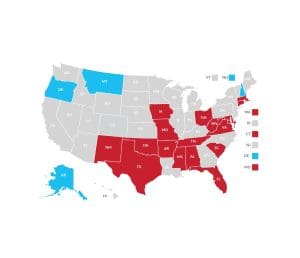
Sales Tax Holidays by State, 2021
Although state budgets may be in unusual places this year, sales tax holidays remain the same as they always have been—ineffective and inefficient.
4 min read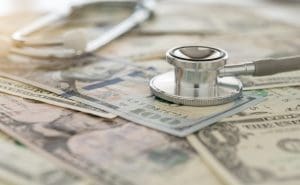
Households Earning $75,000 or Less Paid Majority of Individual Mandate Penalties
Last month, the Supreme Court turned back a challenge to the Affordable Care Act (ACA), allowing to stand the Individual Mandate it created that penalizes taxpayers for not having proper health insurance and opening the way for President Biden and Congress to reimplement it.
2 min read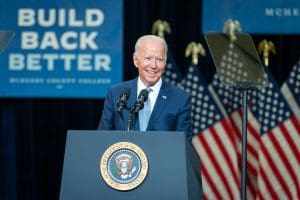
Dynamic Scoring of Infrastructure Spending Proposals Offsets Small Portion of the Cost
While it is good that policymakers are taking the impact of the economy on tax revenue seriously, it is important to remember that the dynamic effect of increased spending would only offset a small portion of the total spending. In other words, new spending—like tax cuts—rarely pays for itself.
3 min read